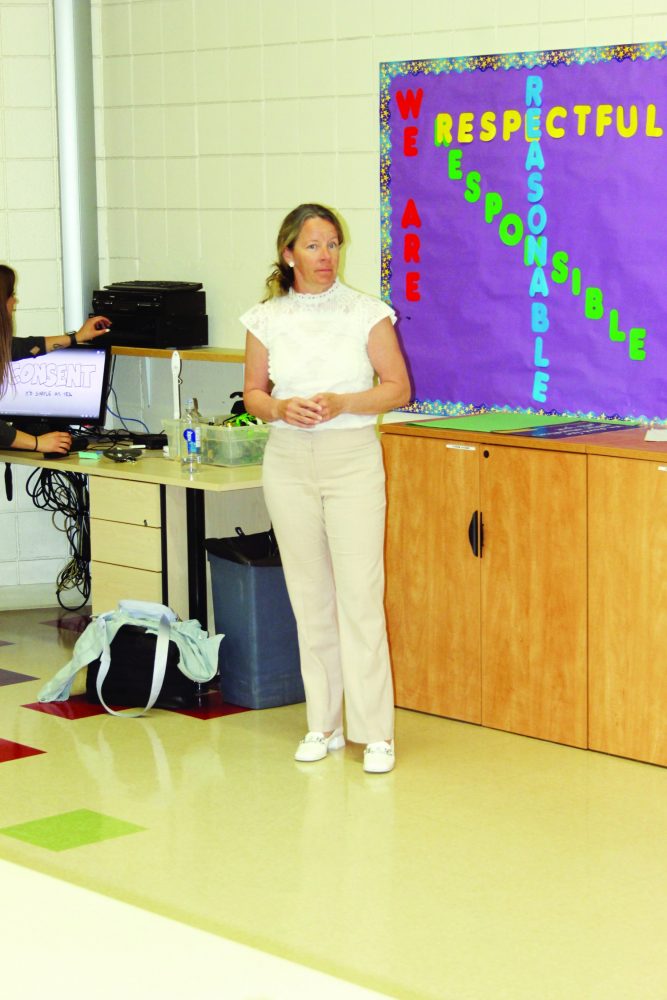West Meadow parents learn more about online safety, security
By Rob Vogt
Anita Swanson wants to help students from Grade 6 to 12 be as safe as possible when they are on social media and the Internet.
The RCMP corporal from Calgary works with the Luna Child and Youth Advocacy Centre as well.
She gave a presentation to about a dozen parents at West Meadow Elementary School on the evening of May 8 after a day of presentations at the school.
Swanson started by discussing consent which is agreement or permission between two people to do something. It can be given or taken away at any time. It can be expressed with words or gestures.
She noted consent is not whether the person said no, but did they say yes?
The law pertaining to consent states the legal age to consent is 16.
There also people who cannot consent. People under 18 cannot consent to sex where the other consenting party is in a position of trust, or authority, or there is a dependancy on that person.
Sexual assault is when the sexual integrity of a victim is violated without their consent. Proof of sexual gratification or sexuality is not required, a sexual purpose is evident, and consent was not given, either verbally or non-verbally.
There is also no statute of limitations on sexual assault.
Sexual exploitation is when someone in authority or trust toward a young person, engages in a relationship with that young person.
Swanson then turned her attention to social media, and provided several pieces of advice.
Social media can be Instagram, Facebook, Twitter and more.
She stressed everyone should privatize their social media, so it is not accessible to the world.
Another simple rule is in real time or not at all, because anyone could be at the other end of their device.
Don’t post nude photos online, because your grandma, your teacher, and everybody else can see them.
Swanson discussed what she calls the “Grandma Rule” – if you don’t want your grandma to see it, don’t post it.
She said there is a real danger in social media when students leave their social media platforms open. That is why it is important to privatize their settings.
Swanson also offered tips to surf social media safely.
Don’t friend anyone you don’t know.
Tell your parents when something makes you uncomfortable, and about anything inappropriate.
Don’t give out your password, birthday, school, or any other personal information.
It is your right to say no and not do something you don’t agree with or feel comfortable with.
Swanson then addressed cyber bullying.
She said youth agree it is easier to get away with cyber bullying than bullying in person. You think it is easier to hide online bullying from parents than in-person bullying.
However, she works in partnership with several agencies who can monitor online activity and report it to the police if it is criminal.
She emphasized the IP or Internet Protocol address will always lead to the person the other end.
You can also share your photos but that is not permission to distribute them to others.
Swanson urged students to not have or keep nude or partially nude photos on their phones or devices.
Child pornography is photos, film, video or anime that depicts someone under 18 years of age being engaged in explicit sexual activity.
Voyeurism is secretly observing a person in a circumstance that gives rise to a reasonable expectation of privacy. That includes video recording a consensual act without your partner’s knowing it is being recorded. Someone cannot be recorded without their consent.
Swanson concluded by offering several take aways from her presentation:
• Real time or not at all;
• The Grandma Rule;
• The two-plus-one rule where you don’t meet someone without a second person with you;
• Don’t share naked photos;
• Ask for consent.
“Talk to your kids openly,” Swanson said.
She pointed out kids don’t want to talk to their parents if they fear they will disappoint their parents or fear splitting up the family or household.

Photo by Rob Vogt

